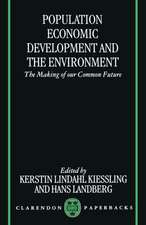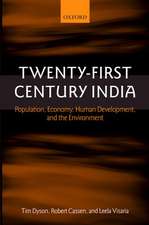Economic, Social and Demographic Thought in the XIXth Century: The Population Debate from Malthus to Marx
Autor Yves Charbiten Limba Engleză Hardback – 9 apr 2009
| Toate formatele și edițiile | Preț | Express |
|---|---|---|
| Paperback (1) | 635.65 lei 6-8 săpt. | |
| SPRINGER NETHERLANDS – 19 oct 2010 | 635.65 lei 6-8 săpt. | |
| Hardback (1) | 641.85 lei 6-8 săpt. | |
| SPRINGER NETHERLANDS – 9 apr 2009 | 641.85 lei 6-8 săpt. |
Preț: 641.85 lei
Preț vechi: 755.13 lei
-15% Nou
Puncte Express: 963
Preț estimativ în valută:
122.82€ • 128.66$ • 101.79£
122.82€ • 128.66$ • 101.79£
Carte tipărită la comandă
Livrare economică 08-22 aprilie
Preluare comenzi: 021 569.72.76
Specificații
ISBN-13: 9781402099595
ISBN-10: 1402099592
Pagini: 189
Ilustrații: X, 190 p.
Dimensiuni: 155 x 235 x 13 mm
Greutate: 0.46 kg
Ediția:2009
Editura: SPRINGER NETHERLANDS
Colecția Springer
Locul publicării:Dordrecht, Netherlands
ISBN-10: 1402099592
Pagini: 189
Ilustrații: X, 190 p.
Dimensiuni: 155 x 235 x 13 mm
Greutate: 0.46 kg
Ediția:2009
Editura: SPRINGER NETHERLANDS
Colecția Springer
Locul publicării:Dordrecht, Netherlands
Public țintă
ResearchCuprins
The Population Controversy and Beyond.- Population, Economic Growth and Religion: Malthus as a Populationist.- From Malthusianism to Populationism: The French Liberal Economists (1840–1870).- The Malthusian Trap: The Failure of Proudhon.- Capitalism and Population: Marx and Engels Against Malthus.- Beneath Demographic Issues.
Recenzii
From the reviews:
“In this volume, Yves Charbit describes how population thinking moved from a stage where it was primarily considered a theme of political philosophy towards a subject of social science, and a subject of economics in particular, making it ready to emerge as an independent scientific discipline towards the end of the nineteenth century. … I would certainly recommend this book … .” (Jan Van Bavel, Population Studies, Vol. 66 (3), November, 2012)
“In this volume, Yves Charbit describes how population thinking moved from a stage where it was primarily considered a theme of political philosophy towards a subject of social science, and a subject of economics in particular, making it ready to emerge as an independent scientific discipline towards the end of the nineteenth century. … I would certainly recommend this book … .” (Jan Van Bavel, Population Studies, Vol. 66 (3), November, 2012)
Textul de pe ultima copertă
According to current understanding, Malthus was hostile to an excess of population because it caused social sufferings, while Marx was favourable to demographic growth in so far as a large proletariat was a factor aggravating the contradictions of capitalism. This is unfortunately an oversimplification. Both raised the same crucial question: when considered as an economic variable, how does population fit into the analysis of economic growth? Even though they started from the same analytical standpoint, Marx established a very different diagnosis from that of Malthus and built a social doctrine no less divergent. The book also discusses the theoretical and doctrinal contribution of the liberal economists, writing at the onset of the industrial revolution in France (1840-1870), and those of their contemporary, Pierre-Joseph Proudhon, who shared with Marx the denunciation of the capitalist system. By paying careful attention to the social, economic, and political context, this book goes beyond the shortcomings of the classification between pro- and anti-populationism. It sheds new light over nineteenth century controversies over population in France, a case study for Europe.
Caracteristici
Takes an innovative epistemological approach Offers an interdisciplinary analysis Provides in-depth historical contextualization















